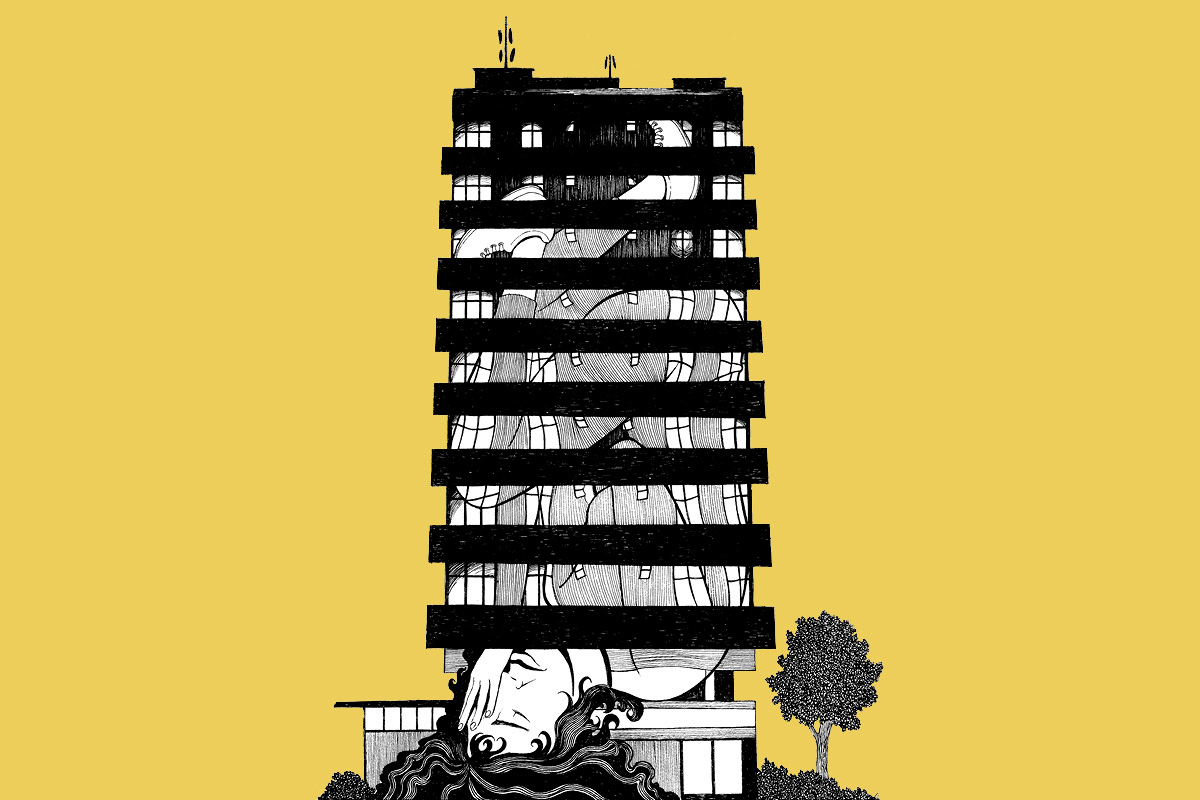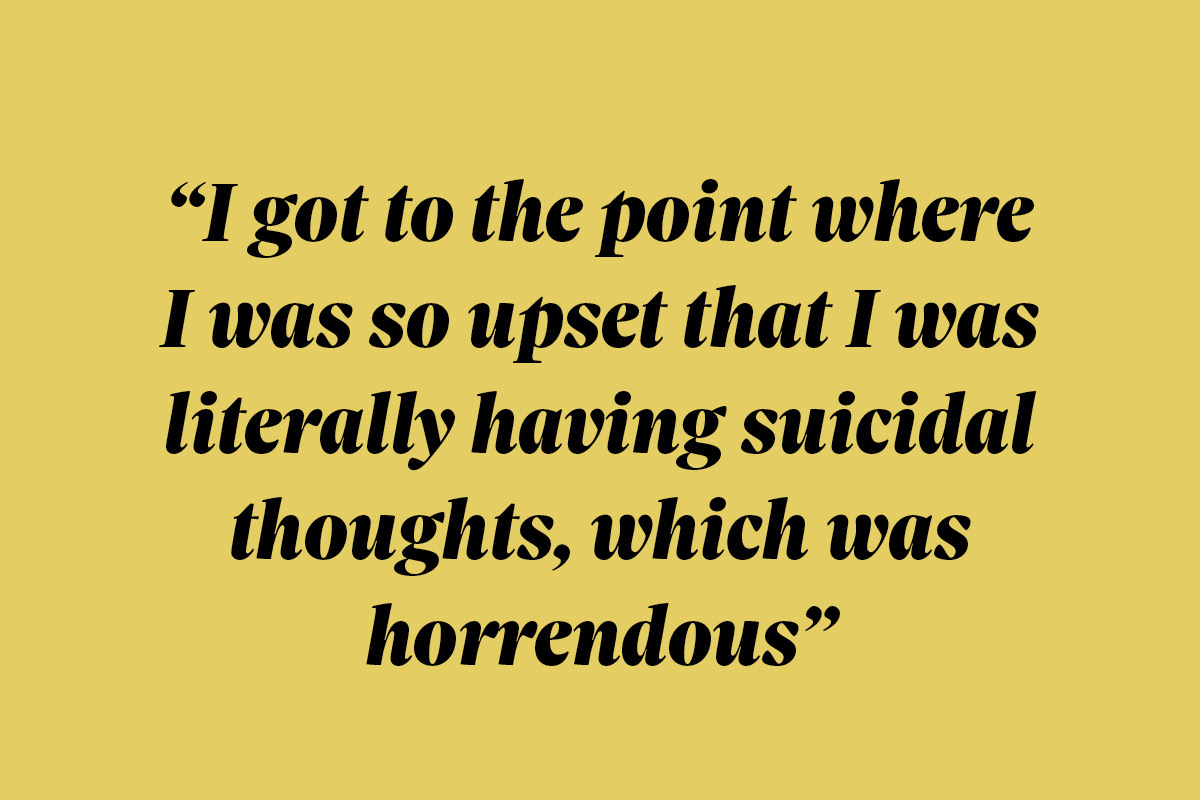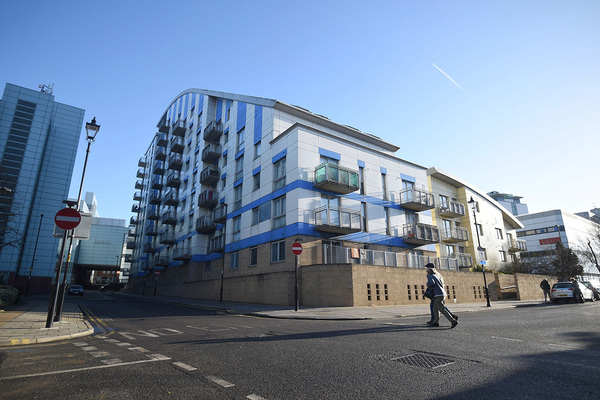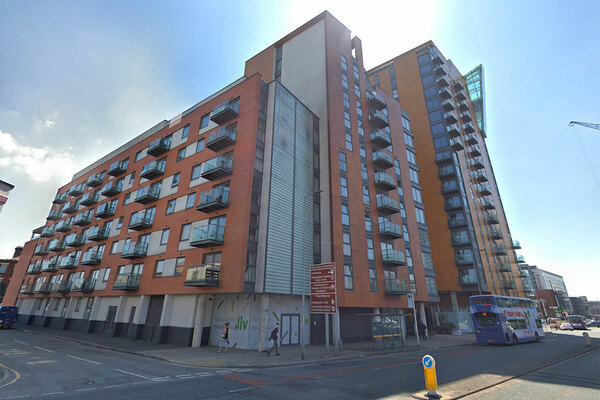The hidden mental health crisis of the cladding scandal
A survey by the UK Cladding Action Group has found that hundreds of leaseholders in blocks with unsafe cladding are struggling to cope with the burden. Jack Simpson reports. Illustration by Rohan Eason
“It’s something I had never done before,” Alice* says, describing the moment she self-harmed for the first time. Alice is a shared owner of a small L&Q flat in Stratford, east London. After a difficult few years, in which she lost her father and underwent surgery to remove a tumour, she felt it was time to sell up and leave London.
A valuation of her flat was carried out, but an issue with her block’s wooden balconies was identified. A surveyor informed Alice that until the balconies were replaced or an inspection was carried out to deem them safe, her home would be difficult to sell. L&Q told her it could potentially take years for this to be completed**.
The knowledge that she could be stuck in her flat for years has severely affected her mental health, to the extent that she was driven to cut herself, she tells Inside Housing.
“Thankfully I have stopped now, but for me to get to that point shows you how much this scandal has brought me to breaking point.”
Alice is not alone. It is estimated that 500,000 leaseholders across the UK live in blocks wrapped in dangerous combustible materials. The mental strain on these residents is huge – and it has triggereda hidden mental health crisis.
This crisis has now been uncovered in a survey carried out by the UK Cladding Action Group (UKCAG). The national campaign group, which represents dozens of affected blocks, surveyed 550 leaseholders on the impact the cladding scandal has had on their mental well-being. The findings are deeply concerning.
Nine out of 10 surveyed say their mental health has deteriorated as a direct result of cladding issues. Just over a quarter have been given formal diagnoses of new mental health conditions, while 35% have experienced a worsening of existing conditions. Most alarmingly, 23% – or 124 people – have considered self-harm or suicide.
Many residents live in fear, knowing that a discarded cigarette or an overturned barbecue on a balcony could start a catastrophic fire. And the financial impact is harrowing. Thousands face huge bills – of up to £900 a month – to pay for interim fire safety measures such as waking watches while the cladding remains in place. These leaseholders live in the knowledge that when the removal starts, British property law means they will be liable for the bill – which could be as high as £65,000 per flat. The majority are unable to sell their homes and could be trapped for years.
And the UKCAG survey barely scratches the surface of the scale of the problem. The 550 people surveyed represent only 143 blocks. There are approximately 1,700 blocks across the country that are covered in dangerous cladding.
“Given the sheer number of unsafe buildings, it is inconceivable the problem is limited to just those who completed the survey,” says Will Martin, founding member of UKCAG.
“I struggle each day to keep myself alive due to the financial worries of ending up homeless and bankrupt”
Some of the comments submitted by those surveyed paint a picture of utter desperation. “I feel hopeless,” one respondent writes. “I feel as a mother I cannot provide a safe home for my child or be a good parent.”
Another writes: “I struggle each day to keep myself alive due to the financial worries of ending up homeless and bankrupt.”
These feelings are reflected in the numbers. More than 84% of those who responded have suffered from excessive worry or anxiety as a result of their situation, 71% have had trouble sleeping, and 14.5% have had suicidal thoughts.
Callum* tells Inside Housing that the cladding issues on his block have for the first time made him understand why people turn to suicide.
“I haven’t contemplated it but I understood why people take that path because it [can feel like it] is the only way out of things like this,” he says.
Callum now lives abroad with his partner, but his flat still hangs like an albatross around his neck. At the end of 2018, just after he moved abroad, his first sale fell through because the buyer was unable to get a mortgage, due to fire safety issues. Since then, two more sales have fallen through. If he cannot sell soon, he is faced with the prospect of having to leave his partner and return to the UK.
The strain on relationships is widespread. Eight out of 10 survey respondents say that their relationships with friends and family had been affected, and 28% say their relationship with their partner had become strained. Fourteen respondents have been forced to continue living with their ex-partners as a result of the situation.
To deal with the stress, 32% have reported an increase in their alcohol consumption, 27% have begun excessive or restrictive eating, and 3% have turned to drugs. In the most extreme cases, people have resorted to self-harm.
“My thoughts are, if I ended it then maybe others would be saved and free from the mess the government has caused”
The survey is full of shocking testimonies. One respondent says he has considered filming his suicide to send a message to the government about the turmoil this situation is causing.
“My thoughts are, if I ended it then maybe others would be saved and free from the mess the government has caused.”
Another says: “My anxiety is through the roof, I have sleeplessness through worry of the financial burden… We just feel trapped and let down by all involved.”
And the COVID-19 crisis has added to this feeling of being trapped – physically, mentally and financially. For some, it has heightened safety fears, with 77% reporting feeling more concerned because of delays to remediation work on their buildings during lockdown.
Rob Burberry, who suffers from asthma, says that he had only left his flat – a high rise in Woking owned by Southern Housing Group and covered in expanded polystyrene insulation – on a handful of occasions during lockdown.
#SocialDistancing out the window tonight at #Eastgate #Woking as fire on 1st floor triggers evacuation, @SurreyFRS attendance + residents wondering, when will @GOVUK #EndOurCladdingScandal 🤔🔥@ukcag pic.twitter.com/u6sjQS6dPH
— Rob Burberry (@RobBurberrya>#SocialDistancing out the window tonight at #Eastgate #Woking as fire on 1st floor triggers evacuation, @SurreyFRS attendance + residents wondering, when will @GOVUK #EndOurCladdingScandal \uD83E\uDD14\uD83D\uDD25@ukcag pic.twitter.com/u6sjQS6dPH
— Rob Burberry (@RobBurberry) April 19, 2020
“I’m sitting there constantly thinking how flammable the block is,” he says. “The problem with having this issue affecting your home during lockdown means you are constantly reminded about it, it never goes away.”
In numbers
45%
Have increased concerns because they are out of work or uncertain about their employment future
35%
Have experienced difficulties selling their properties
84%
Have suffered from excessive worry or anxiety as a result of their situation
26%
Have received counselling or sought medical help
32%
Have reported an increase in their alcohol consumption
Southern says it takes the mental health issues very seriously and recognises that concerns about fire safety can trigger anxiety and other problems. It adds that it is working hard to reassure its residents that, where cladding issues have been identified, it has put in place additional fire safety measures.
Many leaseholders face job losses as a result of the coronavirus pandemic. Just over 45% say they have increased concerns because they are out of work or uncertain about their employment future. Concerns about how to pay their service charges and not lose their homes are constant.
“I’m being chased for money for work on the building [£6,000],” says one respondent, who suffers from stress-induced arthritis. “I’m only getting £575 a month from the government. I’m in the at-risk group so don’t know when I can return to work. I have no idea how I’m going to pay the money.”
“I’m sitting there constantly thinking how flammable the block is”
And with financial burdens weighing heavy on people’s shoulders, safety concerns have worsened existing mental health conditions. Just over 15% of survey respondents say that their depression has returned. Physical complaints such as skin conditions, chronic pain, headaches and migraines have also resurfaced.
This year’s survey, the second mental health survey carried out by UKCAG, also appears to show that the severity of the mental health crisis and its scale are worsening. While a smaller sample size was used last year, with 196 respondents from 21 blocks responding, the percentage of people whose mental health has been “hugely affected” hit 77.8% this year, up from 64.8%. The incidence of suicidal thoughts is also up, from 2.6% last year to 8% this year.
Two key developments in the past 12 months may have contributed: the issue of £0 valuations of properties in blocks with potentially dangerous materials, and the increasing reluctance of banks to offer mortgages for these properties, has grown exponentially since last spring. The Association of Residential Managing Agents estimates that there are 600,000 ‘mortgage prisoners’ across the country, unable to sell their homes as they wait for inspections to deem their blocks safe or get dangerous materials removed.
“My anxiety is through the roof, I have sleeplessness through worry of the financial burden…We just feel trapped and let down by all involved.”
A total of 35% of respondents say that they have experienced difficulties selling their properties, while 36% say they have had trouble switching lenders.
Similarly to banks, the insurance industry is limiting its exposure on buildings with dangerous materials. As a result, it is increasingly difficult to find companies willing to provide building insurance. Without insurance, leaseholders are at heightened risk of repossession.
For those who have secured policies, costs have skyrocketed, in some cases by as much as 1,237% – from £40,000 to £535,000 in one year.
One in five leaseholders say their blocks have struggled to secure building insurance, while 31.9% have seen the cost of their policies increase. Karen*, a retired widow who lives in a block covered in dangerous cladding, says the situation has left her feeling hopeless.
She is one of the women born between 1950 and 1955 who lost out on six years of state pension as a result of the increase in the pension age for women. She is contributing to her block’s monthly waking watch bill of £18,000, despite having minimal income. She says the two traumas have made her question the compassion of the people in power.
This feeling of abandonment by the government is felt widely – 67.3% feel that the government’s response to fire safety issues following the Grenfell Tower fire has been slow and inadequate.
Three years since the tragic fire, there are still 180 private blocks clad in aluminium composite material (ACM) – the same type of cladding that helped the fire to spread at Grenfell. Non-ACM cladding on hundreds more blocks has now been deemed too dangerous and in need of removal.
An MHCLG spokesperson said:"We recognise the concerns of those who continue to live in buildings with unsafe cladding which is why are we bringing forward the biggest change to building safety in a generation.
“It is unacceptable that some residents of high-rise buildings find themselves in this position and we’ve been clear that building owners must take action as soon as possible to ensure their residents’ safety."
Chancellor Rishi Sunak announced a new £1bn fund to support the removal of cladding during his Budget in March. However, many leaseholders have questioned whether it will help them.
In a follow-up survey, carried out after the fund was announced, 24.6% of the 126 respondents did not think the fund would help them, and 54.8% were worried they would miss out.
Details of the fund have since been released. The government predicts that it will cover only a third of the buildings in the country that need work, while those that have already committed funds will be barred.
Many blocks look set to miss out. “The fund just needs to fix the problem for everyone,” says one respondent. “With the added strain of livelihoods disappearing due to COVID-19, it is immoral and unthinkable to leave leaseholders in limbo.”
In limbo is where thousands will remain until a solution is found for all those who feel physically and mentally trapped by the dangerous materials that cover their buildings. And until that solution is found, this mental health crisis will continue to afflict Britain’s high-rise leaseholders.
*Names have been changed.
** L&Q apologised for being unable to provide residents with information for their mortgage provider and the impact this had on the mental health of residents. It said that it is trying to get information to leaseholders but that this is taking time.
Sign up for the IH long read bulletin
Already have an account? Click here to manage your newsletters











